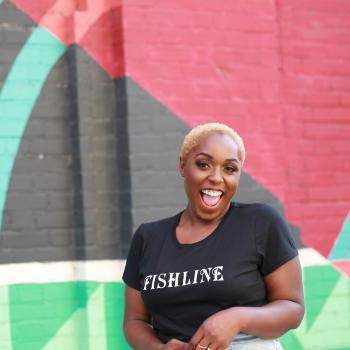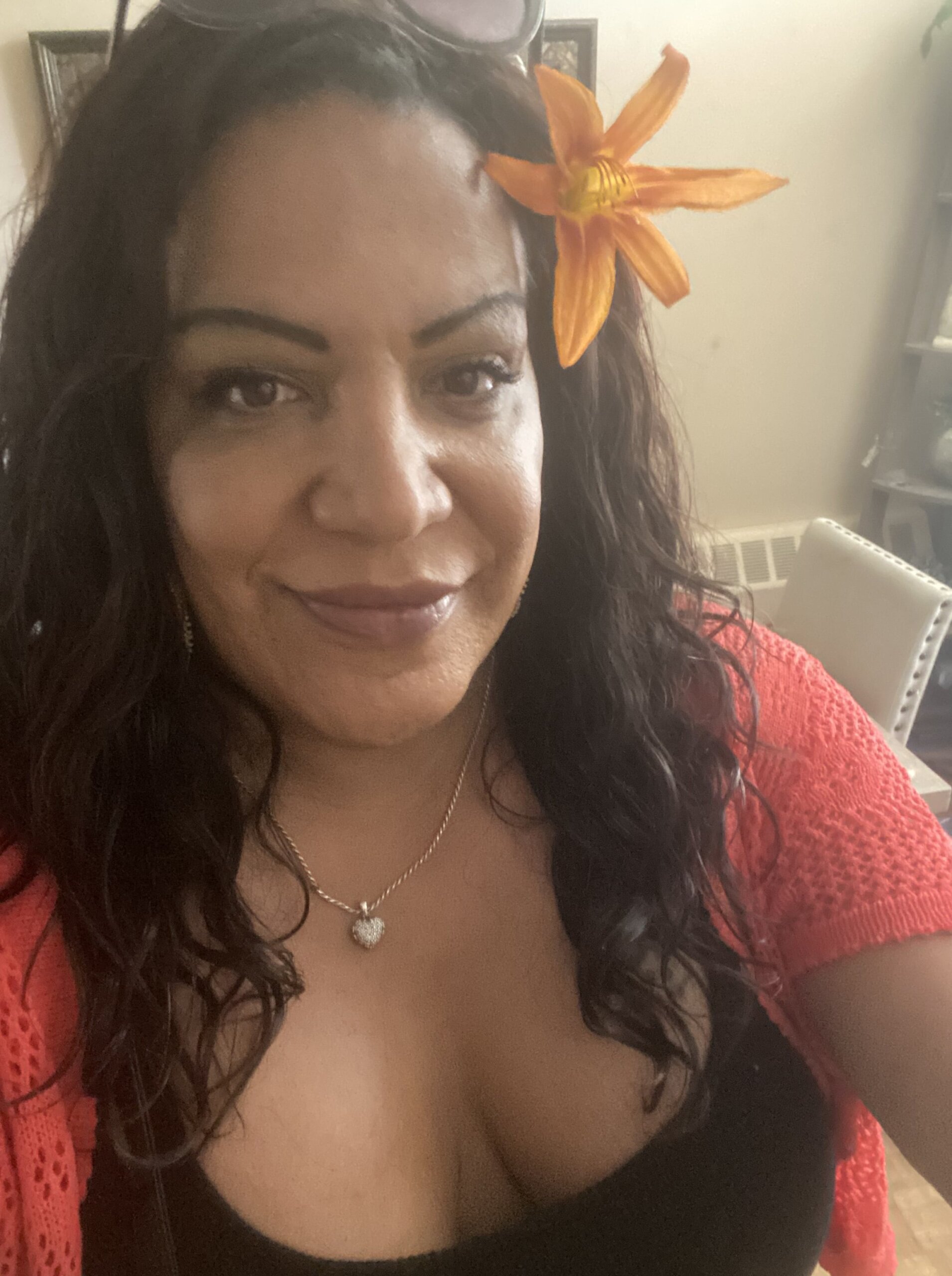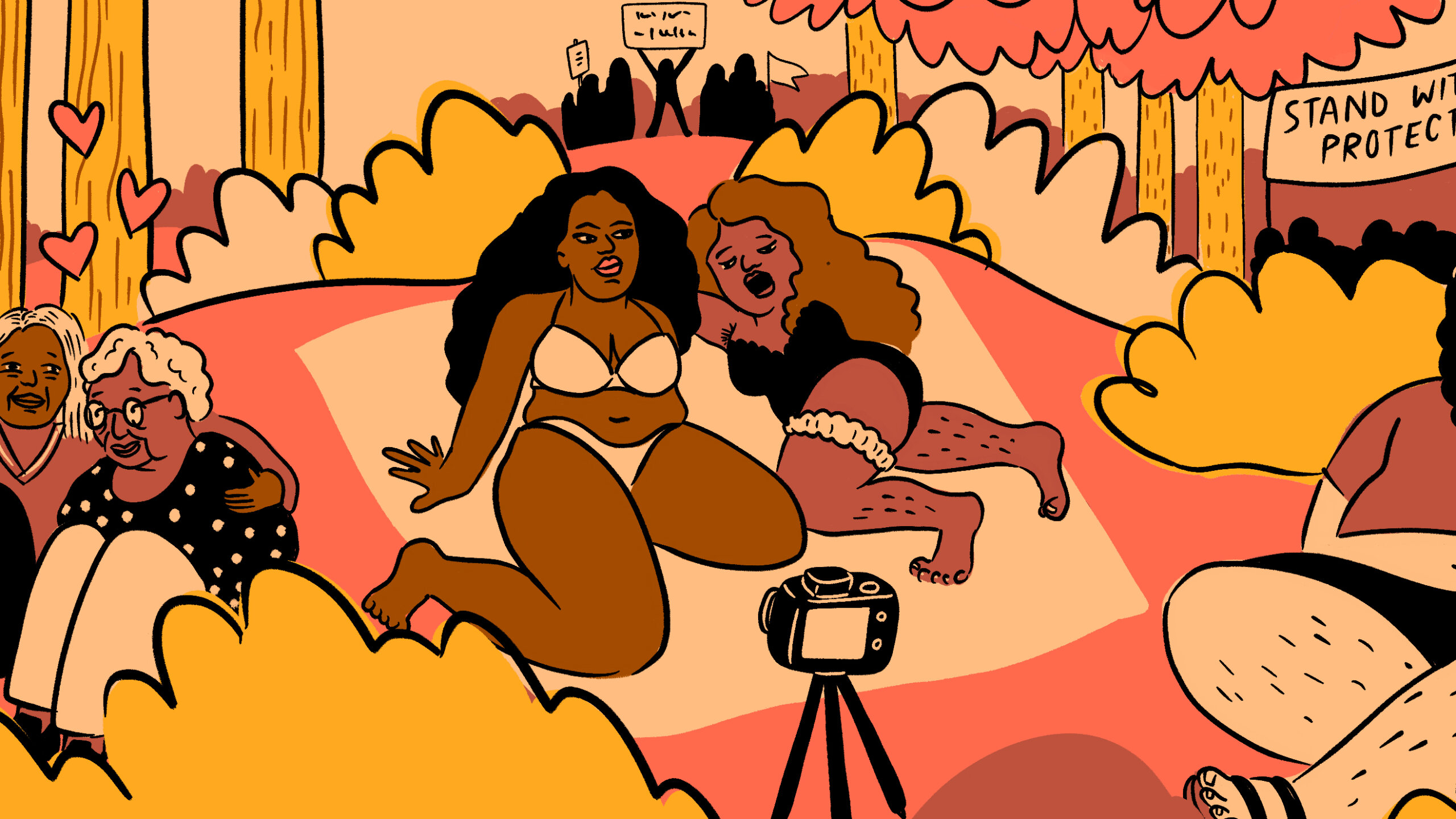This year marks the 50th anniversary of Xtra’s publisher, Pink Triangle Press, which was established in 1971 in Toronto, Canada. The aim of the press’ founding collective was to give a voice to the political and social concerns of gay men and lesbians and to advance the cause of sexual liberation. In November 1971, they launched the influential (and occasionally infamous) gay liberation newspaper, The Body Politic. Fifty years later, Xtra is exploring what sexual liberation means in the 21st century through the six-part series Protest and Pleasure by activist and writer Chanelle Gallant.
In Brooklyn, New York, during the hot girl summer of 2020, Ceyenne Doroshow, the founder and director of G.L.I.T.S. took the stage at what may have been the largest trans liberation rally in history. An estimated 15,000 people had gathered to show their support for Black trans people at a time that saw the biggest uprisings against racism and police violence in U.S. history. Resplendent in her beaded white dress, Doroshow began her five-minute speech by shouting “We’re whoooores!” to roaring applause.
Black trans women are wildly over-represented in the sex industry. According to research, anywhere from 1 to 6 percent of men and women in the U.S. have been paid for sex (though that’s likely an underestimation), whereas the majority of Black trans women have. Doroshow is a former sex worker herself who now directs an organization that works to improve the health outcomes and human rights of transgender sex workers. Why would she proudly call herself a whore, and what does this have to teach all of us about sexual liberation?
This column is the last installment in a six-part series about sex, freedom and justice. Over the past few weeks, I’ve talked to thinkers, activists and artists about how our sexual freedoms and rights are jeopardized by systems of domination and exploitation, and I’ve explored the social justice movements that can transform our lives and free our sexualities.
Now, I want to bring it all together by lifting up the unsung heroes of sexual liberation: sex workers. I believe they have developed the most transformational sexual liberation politics of any social justice movement and are, to quote from writer Andrea Werhun’s forthcoming memoir, “the fiercest, sexiest group of freedom fighters the world has ever seen.”
When most people think about sex work, they likely don’t think about freedom fighters. Instead, they often feel some mixture of fear, pity and—let’s be honest—envy. Most people don’t envision sex worker communities as incubators for transformative politics, solidarity and mutual aid, but they’ve developed that way because sex work is an economic safety net for anyone excluded from the formal economy or from making a living wage. If someone can’t get a good paying job—or any job—because they don’t have capital, whiteness, connections, credentials, immigration status, a clean criminal record, disability accommodations or adequate child care, they still have a smile and a body that can make someone feel good for an hour. That’s very valuable labour.
I’ve been organizing in sex worker communities for nearly two decades and what I’ve seen is… well I’ve seen many things. Among the most significant is how the sex industry brings together just about every marginalized community under constant attack from laws that criminalize them, their clients, their bosses or associates.
These attacks are not about the sex. They’re about the fact that sex workers are cisgender and transgender women, Indigenous people, queer and trans people, drug users, poor and working class people, people of colour, fat people, and sick, disabled and neurodivergent people; they are moms in refugee camps, trans women in prisons, migrant men without immigration status working in the back rooms of underground gay bars and clubs. This diversity of marginalization is the real reason that sex workers are oppressed.
But it’s also why sex work networks can draw on such an exceptional range of wisdom and analysis about systems of domination, how to stand up to them and how to survive. No one knows how to hack the systems designed to keep us in our place better than a room full of sex workers. And that’s on top of their unparalleled knowledge of the complexity of human sexuality. More than anyone else, sex workers know the truth about sex, because their money and survival count on it. They know what people actually want versus what they will say they want in public. What other community brings together so much knowledge about social and economic justice and the secrets of sex, emotions and desire?
To understand what sex worker politics have to teach us about sexual liberation, I reached out to two brilliant and dedicated trans women of colour sex worker activists and leaders. Toni-Michelle Williams is the executive director of Solutions Not Punishment Collaborative (SNaPCo), an Atlanta-based organization working to build safety and end the criminalization of the Black trans community. Williams is, as she puts it, “an organizer, artist, cousin of so many in the movement and twerker.” Monica Forrester is the director of Trans Pride Toronto, an award-winning activist and a longtime friend who has been fighting for low-income and racialized trans people since she helped start some of Canada’s first trans services over two decades ago.
First, let’s get the basics out of the way: both Williams and Forrester echo sex worker movements internationally in calling for its full decriminalization. This is not the same as “legalizing and licensing it” as many well-meaning people suggest. (Watch this video to understand the difference). Criminalizing sex work drives the industry underground, and that kills sex workers. It lets thieves, rapists and abusers know they can target sex workers with impunity; it leads to police abuse and extortion, and it increases domestic violence and child apprehension by the state.
The benefits of decriminalizing sex work are life-saving. Williams says decriminalization would allow sex work “to be recognized as work and there would be policies that support us working in the light and not in darkness.

Credit: Courtesy of Toni-Michelle Williams
“There would be a culture shift away from ‘prostitution’ and ‘solicitation’ toward talking about sex openly and freely. This will lead to more job security for so many of us and more investment in our visions for our own businesses and co-ops,” she says. “We could begin to own blocks as sex worker communities. We could unionize sex workers across state and the country. We would have more protections and safety to engage.”
Decriminalization of sex work is actually good for everyone else, too, because it would provide the police with one less tool to justify surveilling, harassing and abusing working-class communities of colour and immigrant neighbourhoods under the pretext of sex work “investigations.” As I discussed in the second installment of this series, the less power the police have, the better for everyone’s safety—including our sexual safety.
Beyond decriminalization, sex worker movements offer so much more. They invite us to envision political liberation that includes our sexualities. And that brings us to whores.
The term “whore” derives from the words for “dear,” and “beloved,” but it has become a slur used to punish women who step out of their prescribed gender roles by vilifying their sexuality. It is an extremely dangerous tool of exclusion: a good girl is treated as worthy of freedom, respect, safety and protection. A whore is treated as disposable. As visibly sexual people from marginalized communities, sex workers are one of the central targets of whore hatred. But just about any disobedience can be turned into an accusation of sexual immorality: divorce, lesbianism, rejecting a man, being self-confident, taking what’s seen as a man’s entitlement (money, pleasure or a job).
Whore hatred is never just misogynist contempt, though. Targets of whore hatred are especially women of colour and super especially trans women of colour sex workers because they are from multiple communities that have been vilified as sexually immoral. While wealthy white women can more easily slough off the label (and punishments) of whore hatred, it’s not so easy for women of colour, trans women, Indigenous women or poor women, whether they sell sex or not.
How most people—and many social movements—respond to the dangers of whore hatred is to participate in it. Instead of insisting that sex workers, whores and sluts are magic, brilliant and worthy of love and safety, these people and movements distance themselves from them. Witness the mainstream feminist movement: When was the last time you saw women’s advocates like the National Organization of Women lift up a current sex worker as a role model or a “woman of distinction”? Whores don’t count to these kinds of mainstream feminist advocates—some of them can’t even stand women with a bit of cleavage!
I don’t think that their hatred is actually about the sex—or the boobs. Like all forms of oppression, whore hatred is just another way to step on women’s necks and get ahead. Because if there’s anything we’ve seen in this series, it’s that sex is never just about sex—it is mobilized as a political weapon by those in power (including “good girl” feminists) who use sexuality to create divisions and protect their social and economic power.
In general, sex worker movements don’t pull this respectability bullshit. They are arguably the only movements that value and defend women who have been assigned the label “whore” as whole, complex and intelligent human beings, community leaders and beloved family members worthy of protection and care. And they demand protection and recognition for sexual labour as a social contribution. Imagine what would be possible if whores were respected? If that word could no longer serve as a threat, a pretext to deny any woman freedom or even her life. That sort of respect is revolutionary—and it’s a revolution that we can all benefit from.
Listen to how Williams generously offers that “[sexual freedom is] about a culture shift that changes all of our relationships. Number one, our relationship to our own bodies, because sex is also about the relationship to self. Number two, our relationships to sex. We need talk about sex and pleasure. It’s about your desires, how you see your capability in your body, whether you do deep strokes, buss it back, WAP it—it’s about your confidence and competence. We can’t forget that nuance.”
No sexual respectability here, just respect for sex and the people who have it.
Similarly, Forrester described to me how “trans sex workers allow people to recognize that our sexualities should be normalized and accepted and seen as beautiful.
“For myself as a trans women of colour, sex work allowed me to love my body, to love who I am and to love my sexuality,” she says. “I think that opened doors for other people to express their sexualities, to feel safe to be who they are sexually.”

Credit: Courtesy of Monica Forrester
Finally, sex workers offer a vision of a transformed society—because a world that supports, protects and respects sex workers is a world that works for all of us. True justice for sex workers would require the end of all forms of social and economic inequality. It would necessitate the birth of a new world. I asked Williams how the freedom of Black trans women sex workers would affect everyone else: “[Our freedom] would free everybody Black. And everybody white and poor and brown,” she responded.
What Williams is talking about is a principle of Black feminism. As the Combahee River Collective put it in their foundational statement: “If black women were free, we would all get free because black women’s freedom necessitates the destruction of all forms of oppression.” Social change “trickles up,” as the American activist and scholar Dean Spade described it.
But the reverse is not true. Changes that benefit those with more access to power usually don’t trickle down and benefit those on the margins. (Consider the ways in which diversity programs benefit white women more so than all people of colour.)
What this does not look like is the tokenistic lip service offered by today’s lesbian and gay non-profit sector. Forrester had a lot to say about white cisgender-led gay and lesbian organizations that get funding for providing services to poor trans women while doing little to increase their power or safety—and, in many cases, even holding them back. “Our outcomes have not changed much but a lot of people have benefitted from trans women of colour and their visibility and voices and activism,” she says. “Sometimes I feel like we are thrown to the wolves. No one is saving us, but everyone around us is benefitting. It gets disheartening that everyone is on the bandwagon, but no one is making sure that Black trans women are at the forefront of getting things.”
Williams described a broad vision of a more just, peaceful world: “We would lean toward community care, knowing our protection is wrapped up inside each other. We would not have police—or law enforcement at all—or fear being thrown into a cage for having to survive,” she says. “We will not be subjected to physical violence, sexual, verbal or economic violence. Instead we’ll have equity to explore all of our sexualities and entrepreneurship and ways of being.”
Do you see how different this is compared to some of the more narrow demands for sexual liberation, like getting access to marriage? I do. So I asked Forrester why cis people got very excited about gay marriage, while trans women of colour sex workers seem to fight for things that benefit a much wider range of people.
“We are at the forefront of the most vulnerable populations, so we put ourselves on the front line to make change,” she said. “That’s why we are the ones starting the movements—sex work, homeless, drug users movements.” Forrester reminded me of a simple logic: people who are affected by multiple forms of marginalization (like poverty, homelessness and criminalization), are more likely to fight for systemic change because that’s what they need to make a difference in their lives. “We really need to look at the bigger picture and how the system is designed,” she says.
When trans women of colour sex workers lead, it benefits everyone. For example, Forrester described to me how, in the 1990s, she was part of a small group of trans women sex workers who helped to open the first multi-service trans program in Canada. The program was inspired by the slaying of three sex workers in Toronto and was designed to meet the immediate needs of low-income and sex-working trans women.
Being the first of its kind, the program paved the way for all the other trans services that followed. It opened more doors that cis white queer people sashayed through, as they built lives, communities and organizations. “The work that trans women of colour do on the ground is inclusive to everyone—and it opens doors for other populations,” she says. “People benefit from the work that we do, even when we don’t.”
Trans women of colour sex workers have shaped a big, bold vision of fair, safe, loving communities where sex and gender diversity thrives. “If [cis, non-sex-working] people respected and honoured trans people, they could express themselves more in their own bodies. There would be a validity of all of our expressions,” Williams says.
When I ask Forrester and Williams what their specific visions for sexual freedom look like, Williams’ included “health care for all people and comprehensive sex ed to allow folks early on to dream and scheme about how they wanna be in their bodies.” For Forrester, it’s “basic human rights and jobs.” It’s a vision that’s luscious and femme, that has strong communities that look out for each other; it’s chosen families and WAP instead of the cops.
Truly, what’s not to love?
If we want this world, we must get behind its visionaries with our whole hearts. That means supporting the political work of those who are developing and pushing the vision and strategy of sexual and collective liberation. We can start by ensuring that sex workers—including the ones in the streets, the slums and the work camps—get the power, resources and protection that they need to live, lead and thrive.
How can we do this? “Fight for us! When there’s violence, step up for Black trans women,” Williams says. “Centre our leadership, give us opportunities to grow inside of our visions and our skill.”
Political organizing led by the people who are most directly affected is how we fight the power. It is the sacred work of “uprising the people,” as Forrester put it. It binds us to each other in resistance against the ways that domination has ruptured our connections. It is more than a social media hashtag celebrating trans women of colour at the Stonewall Uprisings.
“As trans women of colour, we are very resilient,” Forrester says. “We are brought up to be adaptable and take care of ourselves with the little resources we have. I see that in the generational struggles my family has gone through, too. But I want more than praise for my resilience. I want people to believe that we need change and to help us do it.”
Xtra presents: Protest and Pleasure on Facebook Live. Chanelle Gallant hosts an online conversation with Monica Forrester and Toni-Michelle Williams at 5 p.m. EDT on Sep. 29.


 Why you can trust Xtra
Why you can trust Xtra


